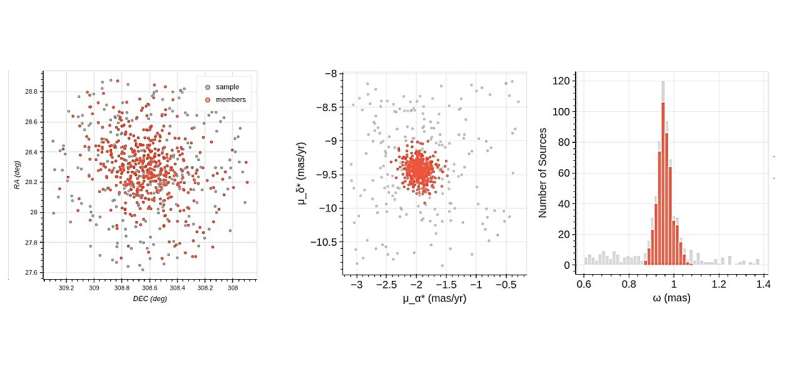
Using the AstroSat spacecraft, astronomers from the Birla Institute of Technology and Science in Pilani, India, have investigated a nearby open cluster NGC 6940. Results of the observational campaign, published December 21 on the pre-print server arXiv, shed more light on the properties and stellar populations of this cluster.
Open clusters (OCs), formed from the same giant molecular cloud, are groups of a few tens to a few hundred stars loosely gravitationally bound to one another. To date, more than 1,000 OCs have been identified in the Milky Way. Studying these stellar groupings in detail could be essential for improving our understanding of the formation and evolution of our galaxy.
Discovered in 1784, NGC 6940 (also known as Melotte 232) is an open cluster in the constellation Vulpecula, at a distance of about 2,500 light years. The cluster is estimated to be 720 million years old and has a near-solar metallicity.
Previous observations of NGC 6940 have found that it harbors several exotic stellar populations, apart from normal single and binary stars, such as blue straggler stars (BSS), blue lurkers (BLs), yellow straggler stars (YSS), and red clump (RC) stars. However, although many studies of this OC have been performed, these exotic stars have not been comprehensively investigated yet.
Recently, astronomers Anju Panthi and Kaushar Vaidya employed AstroSat’s Ultraviolet Imaging Telescope (UVIT) to take a closer look at NGC 6940, with the main aim of gathering more information regarding its exotic stellar content. They also used data from ESA’s Gaia satellite to identify cluster members.
“This cluster has been observed with the Ultraviolet Imaging Telescope (UVIT) on board the AstroSat, which has the ability to detect exotic objects and their hot companions when combined with other multi-wavelength data,” the researchers explained.
All in all, the astronomers identified 492 members of NGC 6940, and 16 of them turned out to be exotic stars. In particular, they found 11 blue lurker star candidates, two yellow straggler stars, two red clump stars, and one blue straggler star.
Furthermore, it was found that three BL candidates most likely have white dwarfs as a hot companion. The two YSS stars have sdB stars as likely hot companions and one of the identified RC stars has a white dwarf companion.
According to the study, NGC 6940 shows evidence of mass segregation, what suggests that dynamic evolution has occurred within the cluster. The massive single stars showcase the highest degree of segregation followed by the equal-mass binary main sequence (MS) populations and then the low-mass single stars.
Moreover, the observations found the presence of an extended main-sequence turn-off (eMSTO) feature in NGC 6940. The astronomers suppose that the age spread of stars is one of the factors contributing to the observed eMSTO. However, they do not exclude the possibility that the effect of stellar rotation and the dust absorption contribute to this.
The authors of the paper also estimated the core radius of NGC 6940, which was calculated to be 9.8 arcminutes and its tidal radius was measured to be 37.5 arcminutes.
More information:
Anju Panthi et al, UOCS-XII. A study of open cluster NGC 6940 using UVIT/AstroSat: cluster properties and exotic populations, arXiv (2023). DOI: 10.48550/arxiv.2312.13605
© 2023 Science X Network
Citation:
Indian astronomers explore open cluster NGC 6940 with AstroSat (2023, December 28)
retrieved 28 December 2023
from https://phys.org/news/2023-12-indian-astronomers-explore-cluster-ngc.html
This document is subject to copyright. Apart from any fair dealing for the purpose of private study or research, no
part may be reproduced without the written permission. The content is provided for information purposes only.







